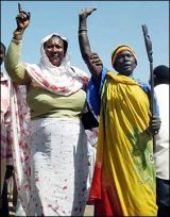Sudanese women demand 30 percent representation
By Sanjay Suri
LONDON, Apr 11, 2005 (IPS) — Sudanese women’s groups have come together to demand a minimum 30 percent representation for women in a post-conflict Sudan.

|
|
Sudanese women, one from the north (L) and one from the south hold hands as they chant ‘sawa, sawa’ (together) during celebrations in Khartoum, 01 January 2005. (AFP). |
The demand followed a meeting held in Oslo in Norway Sunday ahead of the two-day donors’ conference on Sudan. The women’s groups’ demands are due to be discussed on the second day of the conference Tuesday.
The women’s groups came up with a series of recommendations at the Sunday meeting held under the auspices of the Norwegian government, the Norwegian Institute of International Affairs and the United Nations Development Fund for Women (UNIFEM).
The Oslo meeting followed other women’s groups meetings held in Africa to build up the women’s case at the Oslo donors’ conference.
A meeting was held earlier in Kenya’s capital Nairobi where women from southern Sudan gathered to agree a common strategy at the Oslo conference. That forum organised by UNIFEM brought together some 40 women activists who later travelled to Oslo.
The women’s group at Oslo includes delegates from several regions comprising representatives of the Sudanese government, the Sudanese People’s Liberation Movement/Army (SPLM/A), civil society and academic institutions. The women’s group has been offered strong support by the Intergovernmental Authority on Development (IGAD), the African Union, and the group South African Women in Dialogue.
The women’s group said it stands by the principle of equal representation for women and men but was seeking 30 percent representation for now “given the context, situation and issues at stake.” They asked for this minimal representation in the Constitution-making and review processes, and in transitional institutions and all commissions established under the Comprehensive Peace Agreement (CPA).
The group asked also for “urgent programmes for addressing negative customs and practices which continue to foster women’s marginalisation and exclusion in all spheres of life.”
The women asked the donor conference to “ensure the protection of women and girls in terms of safety from sexual and gender-based violence, especially in war-affected areas” and to “create and strengthen institutional mechanisms so that women and girls can report acts of violence against them in a safe and confidential environment.” The women want to establish a ministry of women and gender equality with “full resources, as provided for in the comprehensive peace agreement, and create gender divisions in all other sectors.” The women have recommended creation of a women’s fund within the Multi-donor Trust Fund (MDTF) “for women-specific programmes, and ensure a formal role for women’s organisations in the management and disbursement of funds.”
They want the donors’ conference to formulate pro-poor economic policies and poverty eradication and wealth creation strategies that adequately address the needs and rights of women and girls. They have asked the conference to “ensure women’s economic empowerment through access to entrepreneurship and loan programmes, economic opportunities and marketing, and by facilitating access of women-owned small and micro- enterprises to advisory services, appropriate technology and micro- finance.”
Following are some of the other demands: – Formulate and implement laws for meeting women’s ownership and access to property, especially land income and employment opportunities.
– Cancel debt and ensure that the benefits of such cancellation benefit women, children and communities.
– Give priority to women farmers in view of the fact that they have a key responsibility of providing for their families.
– Involve and grant full access to women combatants in disarmament, demobilisation and reintegration (DDR) processes, in line with UN Security Council resolution 1590 (2005).
– Provide access to safe drinking water.
– Support programmes to halt the spread of communicable diseases and other public health issues, including the impact of environmental degradation on health.
– Enforce and/or enact laws to eradicate all harmful traditional practices that have an impact on the health of women and girls.
– Provide free and compulsory primary education to all girls and boys, and reduce gender disparities in education enrolment and drop-out rates for primary, secondary, tertiary and post-graduate levels, with priority given to war-affected and marginalised areas.
The women’s groups want the donor conference “to commit to principles of gender responsive resource allocation so that at least 80 percent of budgetary allocations and resource support to Sudan’s reconstruction meet the criteria they set out”.
These include programmes that directly benefit women, contributing directly to women’s empowerment and increasing women’s capacities, opportunities and access to resources; reducing gender inequalities in law, policy and practice; directly benefiting young people, especially girls, in disadvantaged communities; and targeting rural areas.
“We also call on the donor community to provide financial support towards the hosting of an all inclusive Sudanese women’s conference that would define a coherent, long-term agenda and strategy for accelerating women’s empowerment and gender equality/equity,” they said in their declaration.
The women’s group called finally for “dedicated funding to support an independent women’s watchdog mechanism that will monitor implementation of the above recommendations.”
